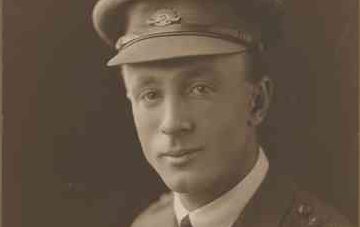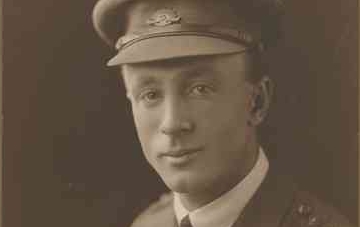

Ross Smith, image courtesy State Library of South Australia B6101
Settings
Smith, Ross – May 1915
[from a letter to his mother dated 31 October 1915]
On the 8th May 1915 we were all very busy striking tents & getting our kits in order and everybody was in the best of spirits… We left at 1 A.M. and marched about 3 miles to a siding & there entrained for Alexandria… The voyage was uneventful until we were a few miles from Cape Helles. It was then that we heard the booming of the big naval guns for the first time…Towards evening the firing grew very heavy & then it was that I really realized there was a war on. It gives one a peculiar sensation to hear the rattle of heavy rifle fire for the first time…
We started to go ashore about 9 P.M… There were lots of stray bullets plonking in the water… but we got no shrapnel to welcome us. The beach was teeming with life & work, men carrying tins of biscuits, others loading mules, & others again unloading & stacking cases & cases of every sort of thing that goes to supply an army. …[E]verything had to be done at night, Turkish Shrapnel being in command of the beach by daylight.
We were ashore anyway just 15 days after the first lot landed… After collecting all our men we started off in the wet and mud up what was then known as Shrapnel Valley… We camped about half way up the valley & got a few hours sleep before “stand-to-arms” at daybreak… That incessant rattle & crack of rifles kept up for about a fortnight after we landed & then gradually eased down to spasmodic bursts… You can imagine the noise but one very soon gets used to it.
The morning after our landing we were told to “digin” & make dugouts on the side of a hill just near where we had slept… We were all digging furiously when their snipers picked us up & we had 5 men hit before we got out of it. Those were our first casualties… Shrapnel Gully was a veritable death road by day & men use to get picked off like flies. The only way to get along was to hug the side of the road that you thought was safe & run for your life across the open spaces. It was certainly sporting to see bullets tear up the ground under your feet almost & wonder how they didn’t hit you.
I often used to wonder if I ever did my 100 yds. faster on the Adelaide Oval than some of my short sprints around corners & across that road!
It was during the next 2 days that I got my first experience of fighting. B Squadron was sent up to reinforce the famous & hotly contested “Quinns Post.” The Turks had been making frequent attacks on it & the 13th. & 16th. Inf. were getting a bit weary after 15 day of it straight off.
…We were well under fire all the time but I only had one man hit & when I got the “hang” of the bullets we managed to get little bits of cover. But I’ll never forget my first night under fire, bullets seemed to be landing everywhere & I was off to shelter as soon as the first signs of daylight appeared. I went into the trenches about 10 A.M. that morning & we were relieved about 11 next morning very tired & cramped. The trench was very narrow & shallow & to put ones head up an inch above the parapet was sudden death…
The night passed quickly because there was plenty to do & lots to think about but at daylight they started with their infernal bombs… 2 burst to just outside the parapet in front of me half burying me with dirt & sand bags. I then felt that I wanted to go home! They got too hot soon after that & we retired into the support trenches… over came more bombs…one came right in. It hit the parapet then the head of the man who was bending down & finally lay, a little round ball of cast iron about the size of a cricket ball, sizzling on the bottom of the trench between us… I just had time to grab my overcoat (which I had taken in for the purpose) & throw it over the bomb as it went off not 3 ft away from me. The fumes were awful & the row knocked me silly for a bit… We had several men wounded with bombs but a coat over them deadens them a lot & incidentally blows to coat to bits.
The first time under fire is always the worst & one gets used to it very quickly.
… after every shot everyone would get up & laugh & go & see where it lobbed. It seems an extraordinary thing that men should laugh & joke when great death dealing things like those shells are landing amongst them but I found myself enjoying the fun as much as any one…
They nearly always picked our mealtimes for their shooting & it was awkward coming back to your dinner & finding a few lumps of dirt in it.
Each Regiment a usually did about a week in the trenches & 2 weeks in the reserve & doing road making & trench digging etc…
On May 24th an Armistice was arranged to bury the dead & lasted for 8 hours. 8 A.M. to 4 P.M. Parties from each side went out & did the job &there were umpires from each side posted half way between the trench & we did our half & they did theirs. I watched part of it but it was a terrible sight & thousands were buried that day, but most of them Turks.

